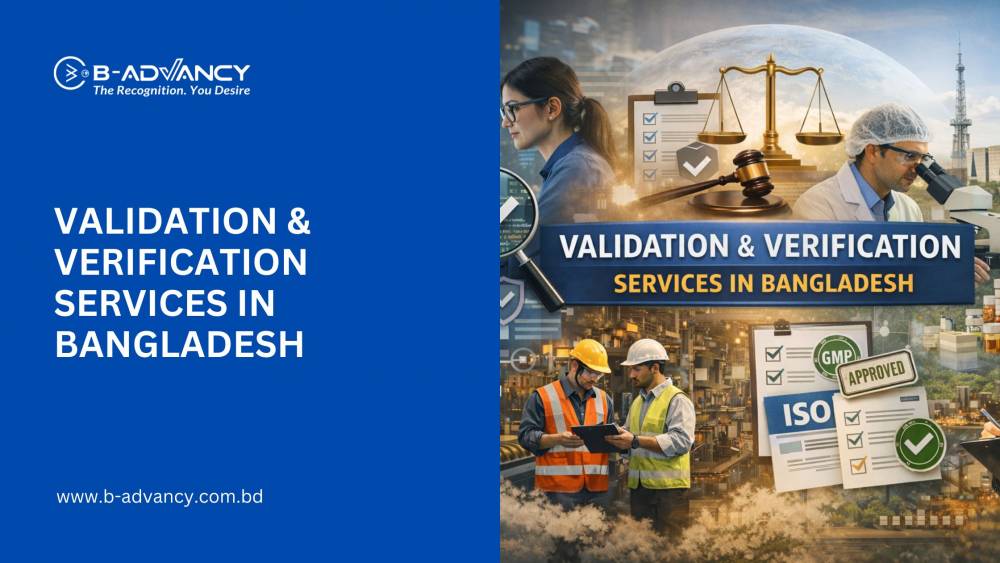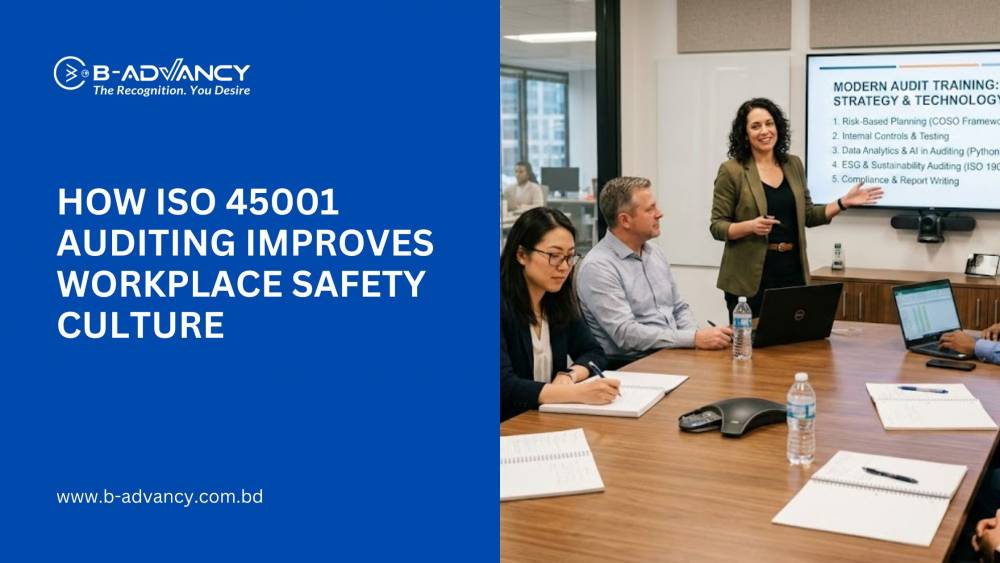The consultancy sector in Bangladesh is growing rapidly, offering services across diverse industries such as business management, IT, finance, and human resources. To maintain high standards of service delivery and gain a competitive edge, consultancy firms can significantly benefit from ISO certification. This blog will explore the importance of ISO certification for consultancy firms in Bangladesh, the advantages it offers, relevant rules and regulations, and how you can begin your certification journey with B-ADVANCY Certification Limited.
What is ISO Certification and Why is it Important for Consultancy Firms?
ISO certification represents a commitment to quality management, client satisfaction, and continuous improvement. For consultancy firms, ISO certification ensures that their processes and services meet internationally recognized standards. Whether it's ISO 9001 for Quality Management Systems or ISO 27001 for Information Security, these certifications build trust with clients by demonstrating a firm’s dedication to professionalism, risk management, and efficiency.
In Bangladesh, the consultancy industry is vital for supporting businesses in optimizing operations, improving strategies, and navigating regulations. By obtaining ISO certification, consultancy firms can enhance their credibility, attract more clients, and streamline internal processes, ensuring long-term sustainability.
Key Elements of ISO Certification for Consultancy Firms
ISO certification is built on several key pillars that help consultancy firms ensure quality service delivery and operational excellence:
1. Quality Management System (ISO 9001)
ISO 9001 focuses on improving a firm's ability to consistently deliver services that meet customer expectations and regulatory requirements. It involves setting up processes for continuous monitoring, feedback, and performance evaluation.
2. Information Security Management (ISO 27001)
For firms handling sensitive client information, ISO 27001 ensures the protection of data against risks like unauthorized access and breaches. It provides a framework for identifying risks, implementing security controls, and monitoring compliance.
3. Environmental Management (ISO 14001)
This certification highlights a firm's commitment to minimizing its environmental impact, making consultancy firms more attractive to clients focused on sustainability.
4. Risk Management (ISO 31000)
ISO 31000 focuses on identifying, assessing, and managing risks. For consultancy firms, it ensures that they can anticipate potential challenges and implement strategies to mitigate them effectively.
Benefits of ISO Certification for Consultancy Firms in Bangladesh
1. Improved Client Confidence and Trust
ISO certification enhances a consultancy firm’s reputation by showcasing its commitment to international best practices, leading to greater client confidence and trust.
2. Streamlined Processes and Efficiency
By adhering to the structured frameworks offered by ISO standards, consultancy firms can streamline their internal processes, improving efficiency and service delivery.
3. Competitive Edge in the Market
Certified consultancy firms gain a competitive advantage, making them more attractive to both local and international clients who prefer working with organizations that adhere to global standards.
4. Risk Management and Data Security
ISO certification helps firms identify and mitigate risks associated with their operations, especially in areas like information security, where breaches can lead to significant client losses.
5. Legal and Regulatory Compliance
ISO certification ensures that consultancy firms remain compliant with both international standards and local regulations, helping avoid legal complications.
Bangladesh Rules and Regulations Regarding ISO Certification
In Bangladesh, the government supports the adoption of international standards such as ISO to improve industry quality and competitiveness. The Bangladesh Standards and Testing Institution (BSTI) is the national authority responsible for formulating and enforcing standards across various sectors, including consultancy. BSTI works in collaboration with the Ministry of Commerce to ensure that consultancy firms meet internationally recognized benchmarks of quality and compliance.
Consultancy firms that deal with sensitive client information are also governed by the Digital Security Act and the Data Protection Act in Bangladesh. These regulations, along with ISO standards like ISO 27001 for Information Security, ensure the protection of sensitive data and promote best practices in data management.
For more information, you can visit:
Steps to Achieve ISO Certification for Your Consultancy Firm
1. Initial Assessment and Gap Analysis
Start by evaluating your current processes against the relevant ISO standards. Identify areas that require improvement and prepare a plan to align your operations with ISO requirements.
2. Develop and Implement an ISO-Compliant System
Design and implement management systems that meet ISO standards, such as ISO 9001 for quality management or ISO 27001 for data security. This will involve setting up structured procedures and assigning responsibilities.
3. Conduct Internal Audits
Perform internal audits to ensure that the implemented systems are functioning effectively. Address any identified gaps and prepare your firm for external audits.
4. Select a Certification Body
Choose a reputable certification body, such as B-ADVANCY Certification Limited, to carry out an external audit of your firm’s management systems. Ensure all documentation and processes are in place before the audit.
5. Achieve Certification and Maintain Compliance
Once your firm has successfully passed the external audit, you will receive ISO certification. Continuous improvement is crucial, so regular audits and updates to your processes will help maintain your certification.
Challenges in Implementing ISO Certification
While ISO certification offers numerous benefits, there are some challenges consultancy firms may face during implementation:
1. Resource Allocation
Implementing ISO standards requires both financial and human resources. However, the investment pays off in the long run through improved client trust and operational efficiency.
2. Change Management
Shifting to ISO-compliant processes may encounter resistance from employees used to traditional practices. Providing training and clear communication about the benefits of ISO can help overcome this challenge.
3. Documentation and Process Overhaul
Achieving ISO certification requires a comprehensive overhaul of processes and documentation, which can be time-consuming. However, this is essential to ensure compliance and consistency.
B-ADVANCY Certification Limited can assist you through every step of the certification process, offering expert guidance to make your journey towards ISO compliance as smooth as possible.
To contact them:
-
Email: bangladesh@b-advancy.com
-
Call: +8801612264559
Conclusion
ISO certification is an essential tool for consultancy firms in Bangladesh looking to enhance their quality of service, build client trust, and stay competitive. With the right approach, consultancy firms can implement ISO standards to streamline their operations, ensure compliance, and open doors to new business opportunities. While the certification process may come with challenges, the long-term benefits far outweigh the initial effort, making ISO certification a worthwhile investment.
By aligning with international best practices, consultancy firms in Bangladesh can secure a stronger position in both the local and global markets, ensuring continued growth and success in the years to come.


17.jpg)



































































































































































































